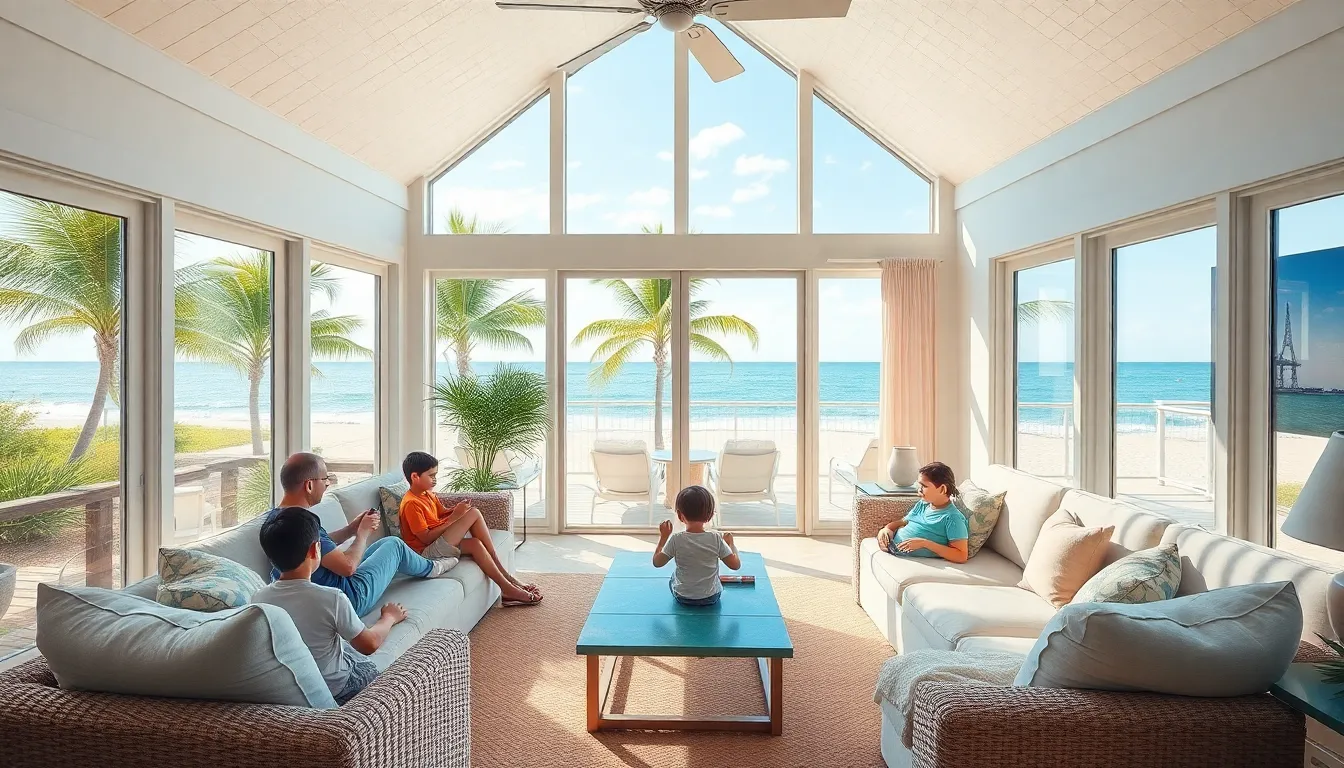When it comes to vacation homes, the age-old debate of renting versus buying feels like a game of Monopoly gone wild. Should one splurge on a cozy cabin or simply snag a rental and call it a day? The decision can feel as overwhelming as trying to fold a fitted sheet. After all, who wouldn’t want a slice of paradise without the headache of upkeep?
Table of Contents
ToggleOverview of Vacation Home Options
Exploring vacation home options involves understanding both renting and buying. Renting typically offers flexibility without long-term commitment. Owners enjoy the perks of a personal space and potential property value appreciation. Investment potential plays a significant role in deciding between the two.
Cost implications for renting often include nightly rates, with averages ranging from $150 to $500, depending on location and season. Buyer’s costs encompass mortgage payments, property taxes, and maintenance fees. A vacation home can present an estimated cost of $300,000 to $600,000 in popular areas.
Rental options provide access to various properties, including beachfront villas and mountain cabins. Alternatively, owning a vacation home grants exclusive rights. Personal use remains a significant advantage when owning, but renting might provide access to multiple locations over time.
Availability for rentals tends to fluctuate with peak seasons, incorporating high demand. Long-term rentals may offer lower rates but limit availability during high tourist seasons. Ownership entails easier access to desired dates and the ability to customize the property.
Ultimately, each option presents unique advantages. Renting allows for exploration without financial constraints. Purchasing a vacation home serves as a personal retreat and financial asset. Choices depend on individual preferences, budget, and lifestyle.
Pros and Cons of Renting

Renting a vacation home presents both advantages and disadvantages. Understanding these factors helps in making an informed decision.
Flexibility and Convenience
Flexibility ranks among the main advantages of renting. Renters can choose different locations and experiences, moving from beach houses to mountain cabins. Convenience also stands out since there’s no commitment to maintenance or property management. Travelers can easily switch properties based on seasonality or personal preferences. Access to a variety of amenities like pools and beachfronts often enhances the vacation experience. Ultimately, renting allows individuals to tailor their getaway without being tied down to a single property.
Cost Considerations
Cost considerations influence many decisions regarding vacation homes. Rental prices typically range from $150 to $500 per night, offering access to desired properties without significant investment. Avoiding long-term financial commitments makes renting an attractive option for those unsure about usage frequency. Yet, travelers must factor in hidden fees, such as cleaning costs or security deposits, which can also affect the total expense. Owning a property involves a substantial upfront investment, often between $300,000 and $600,000, alongside ongoing maintenance costs. Weighing these financial aspects is crucial when exploring vacation home options.
Pros and Cons of Buying
Buying a vacation home offers unique advantages and challenges. Understanding these aspects is crucial for making an informed decision.
Long-Term Investment Potential
Owning a vacation home can serve as a long-term investment. Property values typically appreciate over time, allowing owners to build equity. Investment returns can yield 3% to 5% appreciation annually, depending on location and market conditions. Real estate in popular areas often attracts buyers and renters, enhancing investment value. Furthermore, homeowners can benefit from tax advantages, as mortgage interest may be tax-deductible. Renters lack these financial incentives, making ownership appealing for those prioritizing long-term financial growth.
Maintenance and Responsibilities
Maintenance responsibilities accompany homeownership. Owners are accountable for upkeep, including repairs, landscaping, and general maintenance. These tasks can incur additional costs, making budgeting essential. Notably, an average annual maintenance cost can reach 1% to 3% of a property’s value. Renting entails fewer responsibilities, allowing travelers to focus solely on enjoying their stay. Buyers must consider their available time and willingness to handle these duties before deciding. Embracing the management aspect can lead to fulfilling experiences for those who enjoy home improvement projects.
Factors to Consider in Decision-Making
Considering renting versus buying a vacation home requires careful evaluation of various factors that affect individual choices.
Financial Situation
Assessing one’s financial situation stands out as a critical first step. A budget covers upfront costs and ongoing expenses. For buyers, the initial investment ranges from $300,000 to $600,000, while monthly maintenance costs add an average of 1% to 3% of the property’s value annually. Renters, conversely, face nightly rates between $150 and $500, along with potential hidden fees like cleaning and security deposits. Tax advantages available to homeowners may enhance long-term financial benefits. Evaluating these financial implications helps individuals determine which option aligns with their budget and investment aims.
Location and Usage
Location significantly influences the decision between renting and buying. Popular vacation destinations impact real estate prices and rental availability. Buyers often prioritize access to desirable locations while considering property potential appreciation, typically ranging from 3% to 5% annually. Renting offers flexibility, allowing travelers to experience various locations without long-term commitment. Frequency of use also affects choices; regular visitors may find ownership more suitable, while occasional travelers might prefer the ease of renting. Understanding usage patterns helps clarify which option aligns best with personal preferences and lifestyle.
Choosing between renting and buying a vacation home is a significant decision that requires careful consideration. Each option presents its own set of advantages and challenges. Renting offers flexibility and a hassle-free experience without the burden of maintenance. It’s ideal for those who want to explore various locations and enjoy different types of accommodations.
On the other hand, buying a vacation home can be a rewarding long-term investment. It provides stability and the potential for property appreciation. However, it comes with financial commitments and responsibilities that renters can avoid.
Ultimately, the best choice depends on personal preferences and lifestyle. By weighing the pros and cons of each option, individuals can make an informed decision that aligns with their financial goals and vacation habits.



